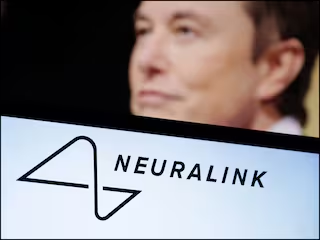'Working Well': Elon Musk's Neuralink Implants Third Patient With Brain-Computer Device

Tech mogul Elon Musk said his company Neuralink Corp’s brain-computer device has been implanted in a third patient, along with plans for about 20 to 30 implants this year.
“We’ve got now three humans with Neuralinks implanted and they’re all working well," he said in a Las Vegas event this week that was streamed on his X social media platform.
A year ago, Neuralink said it had implanted its device in its first patient Noland Arbaugh. The neurotechnology company founded by Musk and a team of scientists and engineers is one of many startups developing brain implants to treat conditions like paralysis and Amyotrophic lateral sclerosis (ALS).
These are experimental procedures that generally require opening up the skull to place electrodes in the brain tissue. Neuralink has two US studies for its devices registered with the US Food and Drug Administration (FDA), according to Bloomberg.
Neuralink’s Prime Study is designed for five patients and allows paralysed patients to control external devices such as computers and smartphones with their minds. The Convoy Study is designed for three patients allowing them to control devices like assistive robotic arms.
Neuralink employs a surgical robot to implant its Brain-Computer Interface (BCI) into the region of the brain responsible for movement intention, which then decodes brain signals and translates them into commands for external technologies. The implant’s “ultra-fine" threads, which carry these signals, have been described as a major innovation in this domain by the company.
In early 2024, Neuralink successfully implanted the device in the second patient, who has been using it to play video games and learn how to design 3D objects.
Elon Musk founded Neuralink in 2016 along with a team of seven scientists and engineers who were experts in areas such as neuroscience, biochemistry, and robotics.
